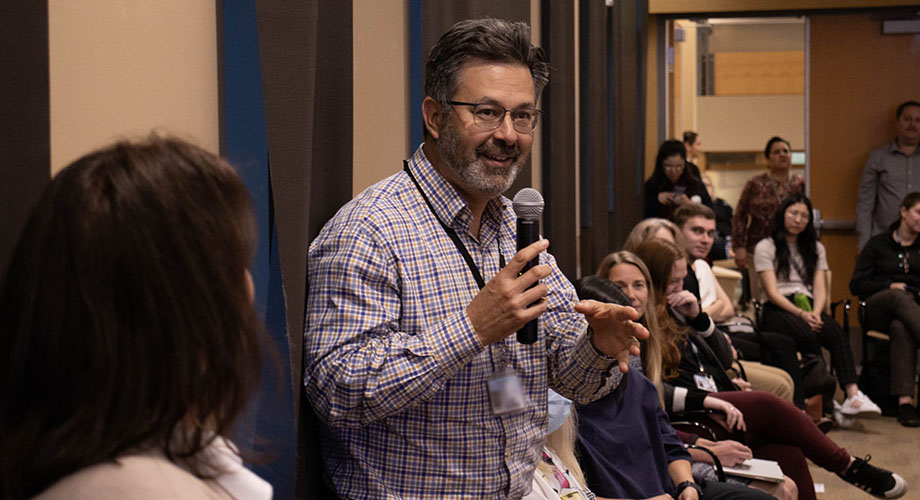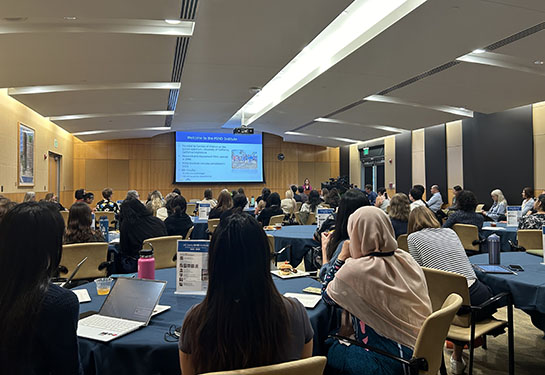MIND Institute event to spotlight path to adulthood for neurodivergent individuals
Free symposium focused on employment and education will kick off annual Distinguished Lecturer Series
The UC Davis MIND Institute is opening its Distinguished Lecturer Series this fall with a symposium about the path from youth to adulthood for individuals with neurodevelopmental conditions.
The free event will take place Wednesday, Oct. 8 at the MIND Institute in Sacramento starting at 3 p.m. It is open to all. Researchers, clinicians, families and community members will gather for presentations, a panel discussion and reception. The focus areas will be education and employment.
The symposium will feature two keynote speakers:
- Laura Grofer-Klinger is an associate professor in the Department of Psychiatry at the University of North Carolina. She studies how best to support individuals with neurodevelopmental conditions from young adulthood through aging. Grofer-Klinger is also the executive director of the UNC TEACCH Autism Program, a system of community regional centers.
- Patrick Dwyer is a research fellow at La Trobe University in Australia. He is an autistic autism researcher whose work focuses on how autistic and neurodivergent people of all ages experience the world around them, including experiences of sensory distress and comfort.
A focus on the transition from youth to adulthood is critical, said Marjorie Solomon, a professor in the Department of Psychiatry and Behavioral Sciences who will also take part in the symposium. “The school system is a major part of the support system for autistic and neurodivergent individuals. When they graduate, they lose this structure that promotes intellectual and social development and engagement with others.”
Solomon explained that employment opportunities are key. “Work promotes well-being and life satisfaction, reduces anxiety and depression, prevents poverty and provides a sense of purpose,” she said.
Drawing on MIND Institute expertise
A panel of MIND Institute experts will also take questions from audience members. They will include:
- Gayatri Mahajan, a developmental-behavioral pediatrician who leads the MIND Institute’s Transition to Adulthood Clinic. The clinic supports young people with neurodevelopmental disabilities and their families during their shift to adult health care.
- Marjorie Solomon, a professor in the Department of Psychiatry and Behavioral Sciences, who researches supported employment and has clinical expertise in social skills training.
- Beth Foraker, the director of Redwood SEED Scholars, a four-year, on-campus inclusive college program for individuals with intellectual disability at UC Davis. She has been an educator for over 30 years and also works in the School of Education.
- Steve Ruder, who is on the team for the Transition to Adulthood Clinic, where he supports families and individuals with disabilities, particularly in areas related to high school transition, adult services and employment. He also works with businesses in the area to promote employment opportunities for individuals.
This is the second year the MIND Institute has launched the lecture series with a symposium.

Watch last year’s symposium and Distinguished Lecturer Series talks
“The format allows for deeper, richer discussion,” said David Hessl, a professor in the Department of Psychiatry and Behavioral Sciences and director of the Distinguished Lecturer Series. “That’s especially important given the diverse group of clinicians, scientists, community members and family members who will be taking part.”
Hessl noted that this year’s topic is quite meaningful. “The MIND Institute itself is now an ‘adult’ — in its mid-20s. The young children who took part in research and were seen in our clinic in those early years are now into adulthood, so this is especially fitting,” he said.
The Distinguished Lecturer Series will continue with its more traditional format starting in January 2026. More details, including lecture titles, will be shared on the series website in the near future. Speakers will include:
- Jan. 14: Andrea Chronis-Tuscano, University of Maryland
- Feb. 11: Sandy Magana, University of Texas at Austin
- March 11: TBD
- April 8: Damien Fair, University of Minnesota
- May 13: Kelsey Martin, Simons Foundation
Quick facts about the Symposium
When: Wednesday, Oct. 8, 2025, 3-8 p.m., including an evening reception.
Where: UC Davis MIND Institute, 2825 50th St., Sacramento, CA, 95817
No registration required. Seating is first-come, first-served.
Event is free and open to all.
The UC Davis MIND Institute in Sacramento, Calif. is a unique, interdisciplinary research, clinical, and education center committed to deepening scientific understanding of autism and other neurodevelopmental conditions. It is a highly collaborative center, bringing together families, researchers, clinicians, community leaders and volunteers with the common goal of developing more personalized, equitable, and scientifically proven systems of support and intervention. The institute has major research efforts in autism, fragile X syndrome, chromosome 22q11.2 deletion syndrome, attention-deficit/hyperactivity disorder (ADHD) and Down syndrome. More information about the institute and its Distinguished Lecturer Series, including previous presentations in this series, is available on the Web at https://health.ucdavis.edu/mind-institute/.




